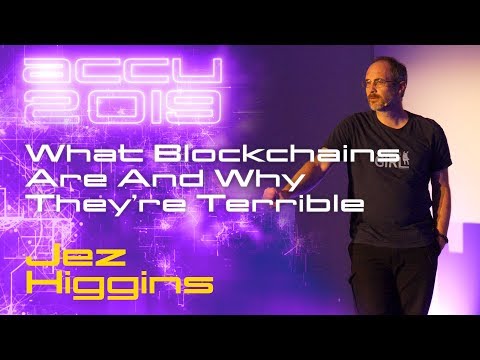By Jez Higgins
Since Bitcoin first rose to public awareness in the early 2010s, cryptocurrency enthusiasts have predicted a new world order. Central banks would fall away to be replaced with a consensus currency arising almost magically out of a worldwide network of independent computers, each transaction indelibly carved into the blockchain. The blockchain, immutable and permanent, stretching back in time to the genesis block, and growing, every few minutes, one block at a time, is, they say, the answer to all our economic ills.
And not just our economic ills: blockchains, perhaps running some kind of smart contract, have been proposed as solutions for insurance markets, music distribution, land registries, voting, distributed file archiving, provenance of artworks and antiques, domain name resolution, human resources records, cross-border customs clearance, and more.
Snakes
In this session, we’ll have a look at what a blockchain is - how they’re implemented, and why they can indeed claim to be immutable. We’ll examine different consensus mechanisms, and how they allow new blocks to be formed without a central authority. That will lead into an overview of transaction mechanisms, and smart contracts. We might even write and a deploy a little smart contract of our own.
Into Snake Oil
Alongside establishing a baseline understanding of what blockchains are, we’ll also be looking at why they’re terrible.
The distributed nature of public blockchains purports to allow us to trust data produced by unknown and, indeed, unknowable third parties. This may not be the case, and if it isn’t you might never know. Blockchains are permanent and immutable, but is this feature or misfeature? While the ideas behind blockchains are all frightfully clever, is a blockchain basically a database with slow reads, really slow writes, and generally awful data throughput? Are they, in fact, ill-suited for many of the applications they are pitched to solve? And if you thought multi-threaded programming was hard, that’s just peanuts compared to smart contracts. Maybe we’ll also get a bit existential and consider whether a blockchain can die, and what happens if it does.
After all that doom and gloom we’ll try to end on a small positive note, with a brief look at a project which I believe is a good fit for a blockchain solution, and which might even make the world a slightly better place.












